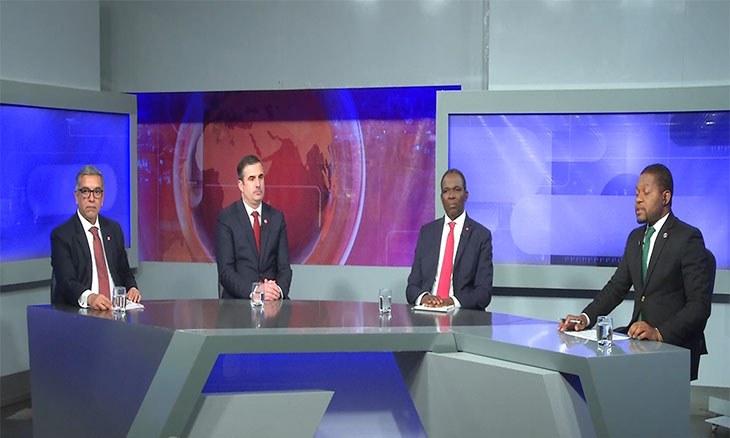Mozambique: Prime Minister invites Japanese businesspeople to boost investment - Watch
Mozambique: Bankers warn of difficult times six months down the line

Photo: O País
Millennium bim administrator, Moisés Jorge, foresees a difficult financial relationship between banks and companies in six months’ time. Speaking on STV Notícias’s “O País Económico” programme on Thursday night, which brought together three bankers and had as theme “Banking in the context of COVID-19”, Moisés Jorge said that many companies might close their doors as a result of the pandemic.
“I believe that we are going to have a really complicated phase here. Even with the measures that we are taking, I am not sure whether, in five or six months we will be at financial peace with the companies. This is a topic that we may well be postponing. There are companies that will certainly leave the market – a perfectly natural death, because there will be a selection; there are companies that will endure it because they were well managed and well capitalised, but I fear that we might have a big problem in terms of companies that today are still able to pay their wages and pay their commitments,” Moisés Jorge said.
The manager of Millennium bim also said that, because of the pandemic, the bank had opted to advance payment of suppliers’ invoices, reducing average payment terms as a way to make life easier for companies, but said it was not an easy task, given that it did not depend only on the availability of liquidity, but also on whether companies had a market and the capital to support their activities.
In turn, Moza Banco’s João Figueiredo proposed the creation of a corporate rescue fund, since, according to his calculations, the worst effects of the Covid-19 crises were yet to come. Now, therefore, was the right time for the Mozambican state to mobilise more support to address the situation.
“Banking can and should continue to maintain its relationship with its customers, from the perspective of the business relationship. It cannot replace the state as far as the dynamism of the relaunch of the economy and of social support for the development of the social structure that we have in the country is concerned. That is up to the state. If the state does not have the financial capacity to find the means and resources to do so, it must seek them with its usual partners, and must find the capacity to sensitise partners so that resources are found to be placed in our economy,” Figueiredo said.
Figueiredo said the state could not continue to live on international aid when it was already “on its knees with its tongue out”. He also said that the country needed to be supported in a timely manner. “The pandemic is universal, it spans the globe. There will not be a country that will see its case resolved, if the others are not resolved. We, for example, have a very deficient health system and, therefore, we need to be helped,” the Chairman of the Board of Directors of Moza Banco said
With regard to companies, Figueiredo urged the creation of a financial rescue fund. “We have to be able to allocate a fund to rescue our business fabric. We are talking here about the default and the restructuring of credit operations for six months. What will happen in six months? Those interests [payments] that have not been paid now and for six months, will have to be paid at the end of six months or else have to be re-capitalised. And debt service will increase,” Figueiredo said.
Chief Executive of Absa Bank Moçambique Rui Barros said that now was the right time for companies to improve their organisation in order to gain access to bank credit, given that the risks associated with business have increased.
“We often hear complaints from civil society about banks that do not lend, do not support certain projects, but the problem is in fact that aspect which has just been highlighted: the ability to document and demonstrate the viability of the business,” he said.
Barros also gave an example of an easy test done by credit analysts, which consists of the question: “If the money were yours, would you lend it?” In his view, this is what should be asked whenever money is being borrowed, bearing in mind that there are other people who could be borrowing money in your exact same circumstances.
Bank managers explain the determinants of current interest rates
Chairman of the Board of Directors of Moza Banco, João Figueiredo, argued that there is room for the reduction of the interest rate in the country, but it was nonetheless necessary to eliminate idle credit, mainly coming from public companies.
“One of the elements that contributes to the interest rate levels that the country has had for a long time is what we in banking call ‘idle credit’, and a large part of this is moneyb owed by public companies. Public companies owe money that contribute to unpaid or non-transparent loan portfolios,” Figueiredo said.
Figueiredo also believes that the time has come for the state to face the situation in depth, because “idle credit means that the rest of the bank’s portfolio has to pay for that credit, which is not remunerated. Many of these public companies are in this situation, and have healthy economies but a huge debt burden. If they were cleaned up financially, they would probably be viable,” he said.
Millennium bim administrator Moisés Jorge said that market conditions determined the interest rates and suggested improvements in the national economy.
“I believe that our macroeconomic framework does not yet allow us to have naturally lower rates. We opened the bank in 1995 and the interest rate was around forty-something percent. The entrepreneurs complained. Today, bank fees are around 16, even 15%, and they continue to complain. It is not necessarily due to the rates that companies do not prosper. It will not be for that reason because surely, if at some point it is not possible to lend the money it has at these rates, they will go down, there is no other way. Because we cannot have idle money. Macroeconomic conditions in the market do not allow for other rates,” Moisés Jorge said.
The Millennium bim administrator also says that there were some public institutions that had liquidity which they sold to banks at a slightly higher than desirable rate. Since they are institutions practically within the parameters of the state, they could, Jorge said. contribute to the lowering of rates.
Absa Bank chief executive Rui Barros denied that his bank was not following signals from the central bank. “Any change in the reference rates, namely the MIMO, is immediately incorporated into the interest rates that banks charge,” he said.
Rui Barros also said that it was not correct that there was discrepancy between the changes in monetary policy that the central bank disclosed and the interest rates practiced in commercial banks.
“Let us try to understand what may be behind these reactions. First of all, there is a credit portfolio that is already in the banks, which are the credits already obtained that are typically at variable interest rates. That interest rate will vary in the next instalment because, at reference rates, the MIMO is low. This drop in the reference rate typically takes about 45 days to come through,” Rui Barros explained.
By Clemêncio Fijamo













Leave a Reply
Be the First to Comment!
You must be logged in to post a comment.
You must be logged in to post a comment.